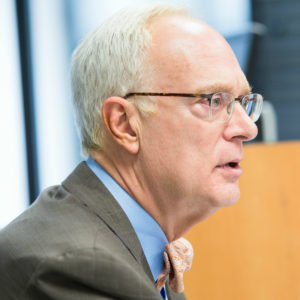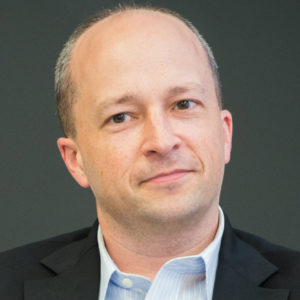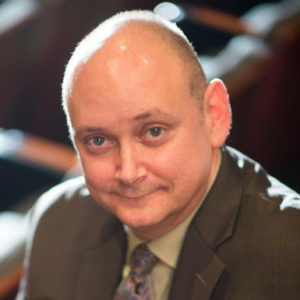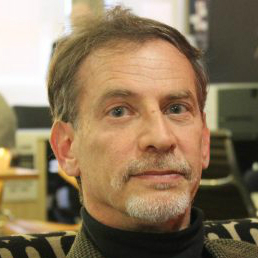American Democratic Capitalism
Explore the intersection of theory and practice in our national politics, and particularly in our key economic debates.
Fall 2014
New York, NY
What is the relationship between capitalism and democracy? Does economic liberty serve and strengthen political freedom, or does the pursuit of self-interest undermine the moral qualities necessary for self-government? Does modern democracy ensure a free and flourishing economy, or do the egalitarian ideals of democratic man require limitations on market competition and lead to an ever-expanding welfare state?
In the modern age, capitalism and democracy emerged together as two ideas of how human beings should govern themselves. It is no coincidence of history that Adam Smith’s classic The Wealth of Nations, the foundational text for the modern idea of the free economy, was published in the same year (1776) that a new democracy was founded in America. This vision of the good society was dedicated to protecting the rights of man to choose one’s leaders and to pursue one’s economic interests. The role of government was to ensure that all citizens could exercise these self-evident rights and liberties forever and always.
From the beginning, democratic and capitalist societies have inspired great moral and political opposition. Modern welfare-state democracies have chosen to set significant limits on the free economy and to redistribute wealth in the name of equality. We have also seen many democratic societies whose origins were not capitalist at all—like modern Israel; and we have seen societies attempting to combine the wealth that only capitalism creates with autocratic governments that no friend of liberty could ever condone.
This institute aims to explore the fundamental questions of political economy, by drawing upon classic texts of modern economic and democratic thought, and then looking at key modern debates and policy dilemmas now facing the advanced democracies of the world.
Week One will be led by Yuval Levin, founding editor of National Affairs and one of the leading public intellectuals in the U.S. Through the study of Aristotle and John Locke, Adam Smith and Karl Marx, we will explore the relationship between the pursuit of wealth and the quest for the virtuous society.
Week Two will be led by Christopher DeMuth, former president of the American Enterprise Institute and Distinguished Fellow at the Hudson Institute. Turning to modern thinkers who help us understand the relationship between democratic politics, public policy, and economic prosperity, we will study Hayek, Shumpeter, Irving Kristol, and selections from Thomas Piketty’s Capital in the Twenty-First Century. With a study of the 2008 Financial Crisis, we conclude by asking whether the good society requires a free economy, and whether a society committed to liberty can also sustain a virtuous citizenry and a just social order.
This course was offered in conjunction with the Tikvah Fund. Image from Wikipedia
Christopher DeMuth on Ideas & Public Policy in DC

Christopher DeMuth is a Distinguished Fellow at the Hudson Institute in Washington, D.C. He was President of the American Enterprise Institute for Public Policy Research from 1986–2008 and D.C. Searle Senior Fellow at AEI from 2008–2011.

Christopher DeMuth is a Distinguished Fellow at the Hudson Institute in Washington, D.C. He was President of the American Enterprise Institute for Public Policy Research from 1986–2008 and D.C. Searle Senior Fellow at AEI from 2008–2011.
A graduate of The Lawrenceville School, Harvard College, and the University of Chicago Law School, Mr. DeMuth was staff assistant to President Richard Nixon in 1969–1970, working on urban and environmental policy, and, during President Ronald Reagan’s first term, was administrator for information and regulatory affairs in the Office of Management and Budget and executive director of the Presidential Task Force on Regulatory Relief. From 1976–1980, he taught at the Harvard Kennedy School of Government and directed the Harvard Faculty Project on Regulation. He has also practiced law (with Sidley & Austin in Chicago and at the Consolidated Rail Corporation in Philadelphia) and been an economic consultant (with Lexecon, Inc.), and was for a time publisher and editor-in-chief of Regulation magazine (now published by the Cato Institute). He is currently a director of State Farm Mutual Automobile Insurance Company and of several nonprofit organizations.
DeMuth was raised in Kenilworth, Illinois, and lives in McLean, Virginia. He and his wife, Susan DeMuth, MD, have three grown children and seven grandchildren. His writings are posted at www.ccdemuth.com.

Yuval Levin is a Resident Scholar and Director of Social, Cultural, and Constitutional Studies at the American Enterprise Institute and the Editor of National Affairs magazine. Mr. Levin served on the White House domestic policy staff under President George W. Bush.

Yuval Levin is a Resident Scholar and Director of Social, Cultural, and Constitutional Studies at the American Enterprise Institute (AEI) and the founding Editor of National Affairs magazine. Prior to joining AEI, he was Vice President of the Ethics and Public Policy Center and EPPC’s Hertog Fellow.
He is a Contributing Editor of National Review and The Weekly Standard and a Senior Editor of EPPC’s journal The New Atlantis. Author and editor of numerous books, including The Great Debate: Edmund Burke, Thomas Paine, and the Birth of Right and Left (2013), The Fractured Republic: Renewing America’s Social Contract in the Age of Individualism (2016), and he most recently published A Time to Build: From Family and Community to Congress and the Campus, How Recommitting to Our Institutions Can Revive the American Dream (2020). His essays and articles have appeared in numerous publications including The New York Times, The Washington Post, The Wall Street Journal, Commentary, and others.
Before joining EPPC, Mr. Levin served on the White House domestic policy staff under President George W. Bush. He has also been Executive Director of the President’s Council on Bioethics and a congressional staffer. He holds a B.A. from American University and a Ph.D. from the University of Chicago. He is a recipient of a 2013 Bradley Prize for intellectual achievement.
Readings:
Readings:
Recommended Readings:
Readings:
Recommended Readings:
Readings:
Recommended Readings:
Readings:
Recommended Readings:

Yuval Levin
Yuval Levin is a Resident Scholar and Director of Social, Cultural, and Constitutional Studies at the American Enterprise Institute and the Editor of National Affairs magazine. Mr. Levin served on the White House domestic policy staff under President George W. Bush.

Ryan P. Hanley
Ryan Patrick Hanley is Professor of Political Science at Boston College. His research in the history of political philosophy focuses on the Enlightenment. He is the author of Our Great Purpose: Adam Smith on Living a Better Life and Love’s Enlightenment: Rethinking Charity in Modernity.

Gregory Weiner
Greg Weiner is President of Assumption University and founding director of the Daniel Patrick Moynihan Center for Scholarship and Statesmanship. He is the author of American Burke: The Uncommon Liberalism of Daniel Patrick Moynihan and Old Whigs: Burke, Lincoln and the Politics of Prudence.

Matthew Continetti
Matthew Continetti is the director of domestic policy studies and the inaugural Patrick and Charlene Neal Chair in American Prosperity at the American Enterprise Institute (AEI), where his work is focused on American political thought and history, with a particular focus on the development of the Republican Party and the American conservative movement in the 20th century.

Darren Staloff
Darren Staloff is a retired Professor of History from the City College of New York and the Graduate Center of CUNY. Professor Staloff has published numerous papers and reviews on the subject of early American history.

Christopher DeMuth
Christopher DeMuth is a Distinguished Fellow at the Hudson Institute in Washington, D.C. He was President of the American Enterprise Institute for Public Policy Research from 1986–2008 and D.C. Searle Senior Fellow at AEI from 2008–2011.